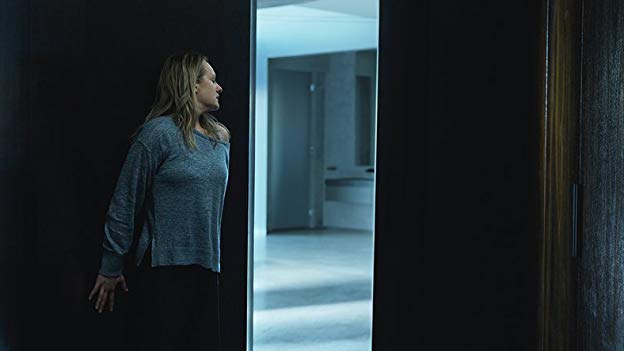‘The Invisible Man’ Review: “Exposing The Real Monster”

Leigh Whannell is no stranger to making a splash in the horror genre. By co-writing Saw with director James Wan in 2004, he changed what got under an audience’s skin, and in 2010 the two perfected the haunted house chiller by taking it to its absolute limit with Insidious. His second directorial effort, Upgrade, proved Whannell as a solo voice worth listening to all on his own, so when it was announced that he would be doing a remake of the 1933 horror classic The Invisible Man, there was considerable excitement.
But this was no simple remake. In this very contemporary re-imagining of The Invisible Man, the title does not refer to a brilliant scientist who accidentally turns himself invisible. The Invisible Man is the abusive figure who society chooses to ignore, whose accomplishments blind the public to the emotional and physical pain they inflict on their victim. No more. Whannell shines a spotlight not on the monster, but on its target, Cecilia Kass (Elisabeth Moss).
After escaping from the clutches of her abusive husband, optics scientist Adrian Griffin (Oliver Jackson-Cohen), Cecilia lives in fear under the protection of her friend James (Aldis Hodge) and his daughter (Storm Reid). Relief comes when Adrian takes his own life, leaving Cecilia a large fortune. Now she can rest easy. But not for long, as strange happenings start to convince Cecilia that Adrian has found a way to turn himself invisible, and is tormenting her, all while the people around her begin to doubt her sanity.
Elisabeth Moss is the centerpiece of The Invisible Man. As a woman who tries to move on with her life, Moss lets the cracks show, the paranoia seep in. Whannell prods at this paranoia with precise employments of suspense. Early sections of the film feel like a cinematic game of “I, Spy”. A couch will gain a small indentation, an object in the background will look slightly warped. Stefan Duscio’s crisp cinematography gets breathing room thanks to Andy Canny’s deliberate editing, allowing dread to coat the viewer.
I’ll admit, I felt a little taxed by the slow-burn approach of the first act. Yet, it’s hard to know if that was the film or my growing discomfort. Moss certainly makes a case for the latter. Her suspicion growing, she loses her grip on what exactly is happening to her, as Moss portrays a struggle between composure and absolute mania. Before she can find her balance, a violent incident midway through the film makes it entirely clear what’s going. Moreover, it reveals the intent of the film.
The Invisible Man blossoms as a primal struggle of woman vs. monster. Transforming the setting of a house gone amiss to the gothic oppression of a metropolitan cityscape and the claustrophobic walls of a mental institution, the score by Benjamin Wallfisch swells into a symphony of synthesizers and screams that gives an operatic weight to the proceedings. Not a moment is wasted. The tension ratches up. And by the time our monster is revealed, it’s a design both alien and familiar to the audience, but nonetheless unforgettable. I found myself muttering a “wow” to myself upon seeing it, and that’s a rare feeling.
There’s not an ounce of fat in The Invisible Man. It has its grip on the audience’s throat the entire time. Though an unseen perpetrator is terrorizing Cecilia, the terrorizer of the audience is clear. Whannell, Moss, and the entire cast and crew give a masterclass on just how to inspire fear. As the film barrels through a bold series of twists and turns, the film further cements its message of showing just how large of an impact that abusers can have on their victims.
The Invisible Man is one banger of a horror film, a career high mark for everyone involved. It has scares galore, a sublime central performance, and a mission: expose the real monster haunting our society. It’s clear to see that The Invisible Man succeeds. –James Preston Poole
Rating: 9/10
The Invisible Man is now in theaters.
The film stars Elisabeth Moss, Aldis Hodge, Storm Reid, Harriet Dyer, Michael Dorman, and Oliver Jackson-Cohen.





